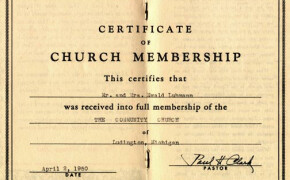
Church Membership is a Biblical Concept. Church membership and adherence to a common church covenant is incredibly Biblical and extremely practical.
A Membership Covenant is a Biblical Idea
One of the questions that gets asked at First Baptist Church is whether we have biblical justification for a Membership Covenant or not. Does this church really have the right, before the Lord, to place expectations regarding belief and behavior on its members? Does First Baptist Church have the right to ask prospective members to hold to a certain common faith, or belief, and to live according to a certain Christian ethic? The short answer is, yes!
The book of Hebrews was written to back-sliding, converted Jews, and the author of Hebrews discusses the differences between the Old Covenant and the New Covenant in Hebrews 8-9. The author is clearly trying to persuade these wayward Christian Jews not to continue in their backsliding. He couches most of his prose in terms of covenantal language. Now, this is very interesting. The sign of the Old Covenant was circumcision, while the sign of the New Covenant is Baptism. But both symbols have certain behavioral, doctrinal, and moral principles attached. They both carry an ethical guideline and anticipate that individuals who embrace those symbols of the Covenant will be accountable to those symbols, not because of the symbols themselves, but because of the realities that those symbols represent. The reason that the author of Hebrews is writing is because these Christian Jews got baptized but decided to go on living like Jews rather than living like Christians. It’s comparable to a man getting married, putting a wedding ring on his finger, and going on to continue flirting with other girls.
Because of their behavior, the author of Hebrews discusses consequences for bad behavior in Hebrews 10, verses 26-39. If you think about it, Hebrews is nothing more than (1) an explanation of the doctrine of Christ, (2) an explanation of the differences between the two Covenants, and (3) a demand that these Christians start living according to their Baptism. Warnings and blessings are scattered throughout, accompanied by examples of people under the covenants who were either punished or blessed because of their faithfulness. Finally, the letter concludes with an exhortation to moral behavior. Many historical church covenants have a lot of common ground with the pattern and purpose of the book of Hebrews. In fact, a Church Membership Covenant is really nothing more than a document that is based on the pattern of the book of Hebrews. It is a document that affirms that a believer holds to a certain doctrinal understanding of Christ, and as a result, holds to certain moral and behavioral expectations because of their faith in Christ. An appendix to the Covenant that discusses consequences or church discipline for a failure to adhere to those guidelines is nothing more than a snapshot of Hebrews 10:26-39.
To learn more about church membership and the beauty of belonging to a body, join us for our next church membership class! See event details here.
